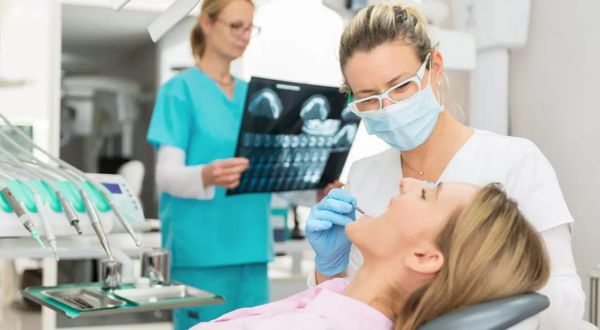Impacted Wisdom Teeth
Scientists believe that wisdom teeth have developed as an evolutionary reaction to eating raw meat, vegetables, and roots. During teenage and adulthood, also referred to as the “wise years,” some individuals grow their third set of molars. They may not always work properly, and they may clog your mouth or lead to more issues.
The symptoms of wisdom teeth that are impacted or don’t have enough room to erupt are as follows:
- Red or swollen gums
- Tender or bleeding gums
- Jaw pain
- Swelling around the jaw
- Bad breath
- An unpleasant taste in your mouth
- Difficulty opening your mouth
Other oral health issues that may be associated with some of these symptoms include:
Pain and irritability:
Wisdom teeth may cause discomfort as they erupt. If you are in pain or discomfort, consult your dentist for a check-up and an x-ray. These can aid to determine whether the pain is caused by the wisdom teeth or something else. Check according to your dentist if an extraction is required as they are not always the best option, and the pain may eventually subside without the need for one.
Crooked teeth:
If the wisdom teeth erupt incorrectly, they may cause the neighboring teeth to migrate and shift. They might potentially harm the teeth next to them. Single tooth extraction may have no effect on nearby teeth. There are various theories as to why wisdom teeth erupt sideways and are crooked.
A third molar should not be able to fit in your jaws since it would interfere with the existing teeth, forcing it to develop sideways. To give yourself more room to correct your misalignments, you might think about having impacted wisdom teeth removed before beginning orthodontic treatment.
Eating Difficulties:
If you have trouble eating, your wisdom teeth need to be removed. Between the gums and the tops of the teeth, food can get caught. It could be very challenging if you can’t reach the rear of your mouth and brush thoroughly. To detect the finest treatments for this issue, consulting a dentist is the simplest course of action. Removal may be the only viable solution if the cause of the issue cannot be identified.
Sinus Issues:
Wisdom teeth might contribute to sinus issues. As the upper jaw’s teeth erupt and expand, complications arise. When teeth and roots grow, they may bump up against the sinuses and rub against them, irritating them. Even though it is uncommon, wisdom teeth can occasionally result in sinus pain, headaches, pressure, and congestion.
When should it be taken off?
If wisdom teeth are painful or irritating, it might be challenging to clean them properly. Furthermore, unless it causes damage to nearby teeth or the jawbone, the tooth will be extracted if food debris and dental plaque build-up cause gum infection around it.
An oral surgeon should be consulted if the patient has a current medical condition that increases their risk of problems. Dentists cannot always predict which wisdom teeth will be problematic.
Moreover, regardless of your teeth’s condition, regular dental visits can help you stay relaxed in the long run. Your mouth will stay healthy and pain-free if you practice good oral hygiene and eat a balanced diet.
Dental Deep Cleaning and the Benefits to Oral Health
Deep cleaning your teeth regularly are very important. This is primarily since professional dental cleanings may reach areas that regular brushing and flossing cannot. Regular dental cleanings can aid in the early detection of many common dental issues. Periodontal scaling and root planning are other names for the thorough dental cleaning process.
Let’s discuss the significance of dental deep cleaning in detail:
- Regular dental thorough cleaning can help detect and avoid the following conditions, among others.
- Getting regular dental cleanings can also assist you to avoid developing gum disease. This occurs as a result of the cleaning’s ability to prevent the growth of diseases that affect your mouth. The accumulation of bacteria on the gums is the cause of many disorders. If you clean the tartar and plaque from your teeth, your gums will be healthier. As a result, there is a lower likelihood that your gums may become infected.
- Having routine dental cleanings makes you feel better overall. This is due to the link that exists between your dental health and general health. Heart disease and stroke are linked to your oral health. Regular dental cleanings and examinations are crucial since they can aid in the earlier diagnosis of many of these life-threatening conditions.
- Regular dental cleanings might assist you to avoid losing any teeth. Lack of dental deep cleanings can cause plaque and tartar to accumulate on the gums, which dental cleaning can help eradicate. Regular deep cleaning can even assist in identifying dental issues such as cavities before they cause more harm.
- Dental deep cleaning can keep your smile healthy and straight, maintaining and safeguarding it. A healthy grin not only improves your mood and boosts your sense of self-worth and confidence, but also influences how others perceive you.
Dental deep cleaning benefits:
Following a dental deep cleaning has some benefits, including:
- Cleaning your teeth from the gum line-up.
- Eradicating gum disease-related halitosis or unpleasant breath.
- Keeping your teeth’s roots healthy.
Capture Life Dental Care, Dental Hospital in Hyderabad has sound repute as one of the most trusted dental healthcare providers in the region.
AUTHOR BIO:-

Dr. Namrata Rupani – Fearless Photographer| Fine Art Printer| TEDx Speaker| Wedding| Wildlife | Passion | Dentist | Wedding Photographer. For more information visit website www.capturelifedentalcare.com

